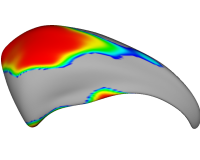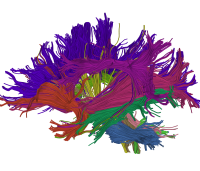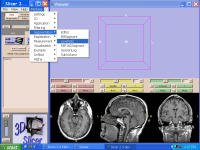DBP1:Harvard
Back to NA-MIC DBP 1
Overview of Harvard PNL DBP 1
The Harvard Driving Biological Project uses structural MRI, diffusion-weighted MRI, and fMRI to study the neural bases of schizophrenia and related psychiatric disorders. The DBP is centered in the Psychiatry Neuroimaging Laboratory (PNL) at Brigham and Women's Hospital in Boston, MA.
For more information about the PNL, please visit the lab website.
Harvard PNL Projects

|
Shape Analysis of Brain StructuresIn this work, we present shape analysis algorithms for brain structures. More... New: G Gerig, S Joshi, T Fletcher, K Gorczowski, S Xu, S M. Pizer, M Styner: Statistics of populations of images and its embedded objects: Driving applications in neuroimaging, IEEE Symposium on Biomedical Imaging ISBI 2006. |

|
Algorithms: Diffusion Tensor Imaging (PNL-MIT)This collaboration focuses on the analysis of diffusion tensor images of the brain, including clustering analysis of fiber tractography. More... New: Here we give something new and exciting about the project. The most recent publication on this project is very appropriate for this slot. |

|
Algorithms: Anatomical Segmentation (PNL-MIT)Research in this area produces algorithms used to segment medical images, for example separating the brain into separate tissue classes and neuroanatomical structures. More... New: Here we give something new and exciting about the project. The most recent publication on this project is very appropriate for this slot. |

|
Algorithms: Rule-based Segmentation (PNL-GaTech)This project has produced a method for semi-automated parcellation of brain structures, including the dorsolateral prefrontal cortex and the basal ganglia of the human brain. More... New: Here we give something new and exciting about the project. The most recent publication on this project is very appropriate for this slot. |
Algorithms: Tensor Based Statistics (PNL-Utah)This collaboration has focused on improving the measurement of diffusion tensors and comparison between diagnostic groups. More...
| |
Engineering: Slicer Improvement and TestingThis ongoing work conducts testing and development of new features in Slicer and provides a bridge between developers and researchers using the software. More...
| |

|
Training: Training Material and Expert Users FeedbackWork in this area has created training materials for Slicer software with the input of expert users. More... |
Biology: Genetics and Imaging (Toronto)This collaboration is centered around a study of psychosis in schizophrenia and bipolar disorder, using a combination of genetics and diffusion tensor imaging. More... |
For more introductory information, follow this link.